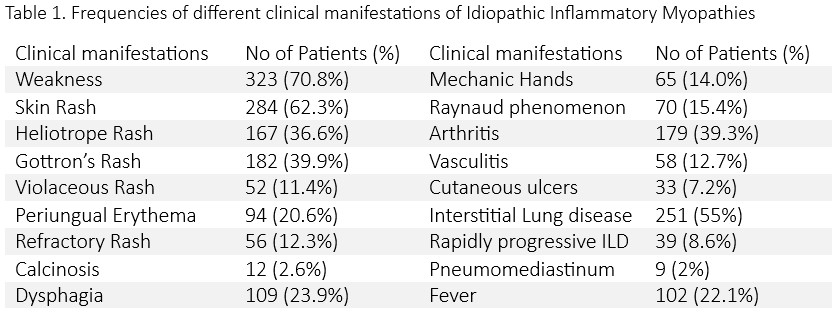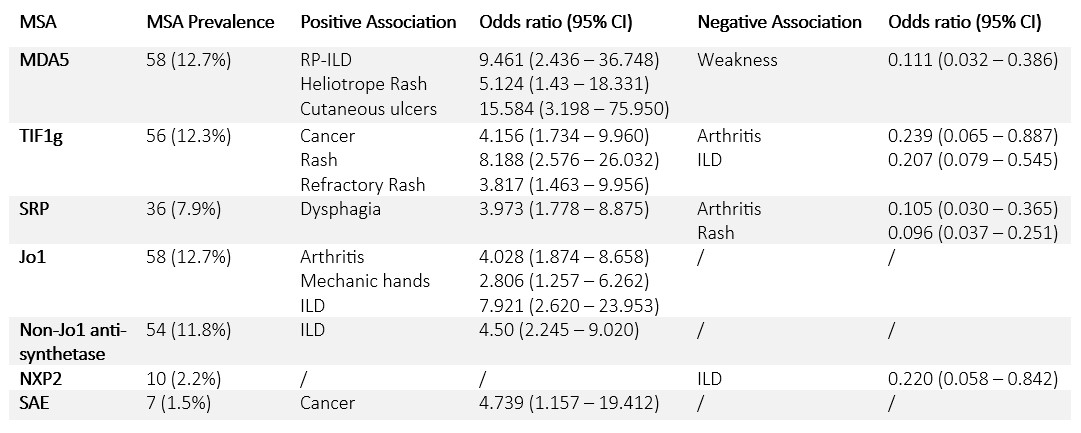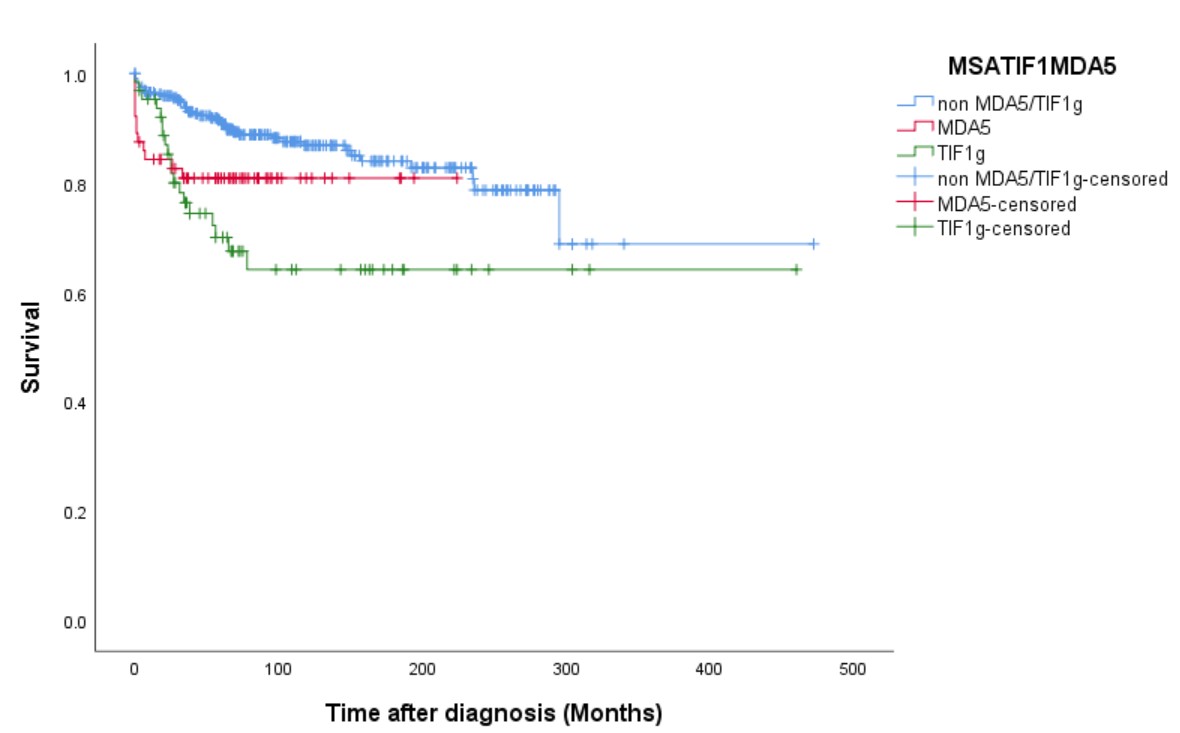Session Information
Date: Monday, November 13, 2023
Title: (1155–1182) Muscle Biology, Myositis & Myopathies – Basic & Clinical Science Poster II
Session Type: Poster Session B
Session Time: 9:00AM-11:00AM
Background/Purpose: Idiopathic inflammatory myopathies (IIM) are a group of heterogeneous autoimmune diseases with cutaneous, musculoskeletal, and systemic involvements. The Hong Kong Myositis Registry (MyoHK) was established to collect longitudinal data on Hong Kong adult IIM patients to enhance our knowledge on the clinical courses and prognosis in IIM.
Methods: This was a retrospective multicentre cohort. Consecutive adult IIM patients followed up in 7 rheumatology centers in Hong Kong were reported voluntarily to the MyoHK registry from January 2018 to May 2023. Additional IIM patients were identified by the Clinical Data retrieval system. Electronic patient records were reviewed. Demographics, clinical data, myositis-specific antibodies (MSAs) and mortality were documented.
Results: 456 patients were included with a mean age at diagnosis of 53.9 ± 13.5 years and 71.1% were female. The median follow-up duration was 72 months (IQR 37-148.8). The most common clinical subtype was dermatomyositis (39.9%), followed by polymyositis (36.4%) and amyopathic dermatomyositis (21.9%). 330 (77.5%) had at least one positive MSA. Anti-melanoma-differentiation-associated gene 5 (Anti-MDA5) and anti-Jo1 were the most prevalent MSAs, both identified in 58 patients (12.7%), followed by anti-transcription-intermediary-factor-1-gamma (Anti-TIF1g) (12.3%) and non-Jo-1 anti-tRNA-synthetase antibodies (11.8%). Interstitial lung diseases (ILD) affected 55% of IIM patients, of which 39 patients (8.6%) had rapidly progressive ILD (RP-ILD). Cancer occurred in 84 patients (18.4%), with Nasopharyngeal cancer and lung cancer accounting for 22.6% and 20.2% of all malignancies respectively. Mortality was reported in 74 IIM patients (16.2%) with 22 (4.8%) reported within 6 months of IIM diagnosis. The leading causes of overall mortality were infection (25.6%), malignancies (23.0%) and respiratory failure (18.9%), whereas respiratory failure accounted for 40.9% of deaths occurring within six months of IIM diagnosis. The presence of anti-Jo1 [OR 7.92 (95% CI 2.62-23.95)] and non-Jo1 anti-synthetase MSAs [OR 4.50 (95% 2.24-9.02)] were associated with the development of ILD, whereas anti-MDA5 was associated with RP-ILD [OR 9.46 (95%CI 2.44-36.75)]. Anti-TIF1g [OR 4.16 (95%CI 1.73-9.96)] and anti-SAE [OR 4.74 (95%CI 2.25-9.02)] were associated with malignancy. Tables 1 &2 summarized the clinical manifestations and association with MSAs. Cox regression analysis confirmed older age [HR 1.09 (95% CI 1.06 – 1.11)], RP-ILD [HR 5.79 (95% CI 2.77 – 12.10)], and cancer [HR 3.85 (95% CI 2.19 – 6.77)] to be independent predictors of mortality while anti-MDA5 tended to associate with mortality [HR 1.98(95% CI 0.96 – 4.12)]. Multivariate analysis revealed RP-ILD [HR 7.59 (95% CI 1.77 – 32.53)], MDA5 positivity [HR 5.06 (95% CI 1.05 – 24.24)] and age at diagnosis [HR 1.06 (95% CI 1.00 – 1.13)] were associated with mortality within 6 months of diagnosis. Figure 1 showed the survival between anti-MDA5, anti-TIF1g and rest of IIM patients.
Conclusion: Anti-MDA5 and anti-Jo1 antibodies are the commonest MSA among Hong Kong IIM patients. Older age, presence of cancer and RP-ILD were predictors of mortality. Anti-MDA5 was associated with early mortality.
To cite this abstract in AMA style:
Tang I, So H, li T, Tang V, Ho C, Ho R. Presentations and Outcomes of Idiopathic Inflammatory Myopathies in Hong Kong [abstract]. Arthritis Rheumatol. 2023; 75 (suppl 9). https://acrabstracts.org/abstract/presentations-and-outcomes-of-idiopathic-inflammatory-myopathies-in-hong-kong/. Accessed .« Back to ACR Convergence 2023
ACR Meeting Abstracts - https://acrabstracts.org/abstract/presentations-and-outcomes-of-idiopathic-inflammatory-myopathies-in-hong-kong/



